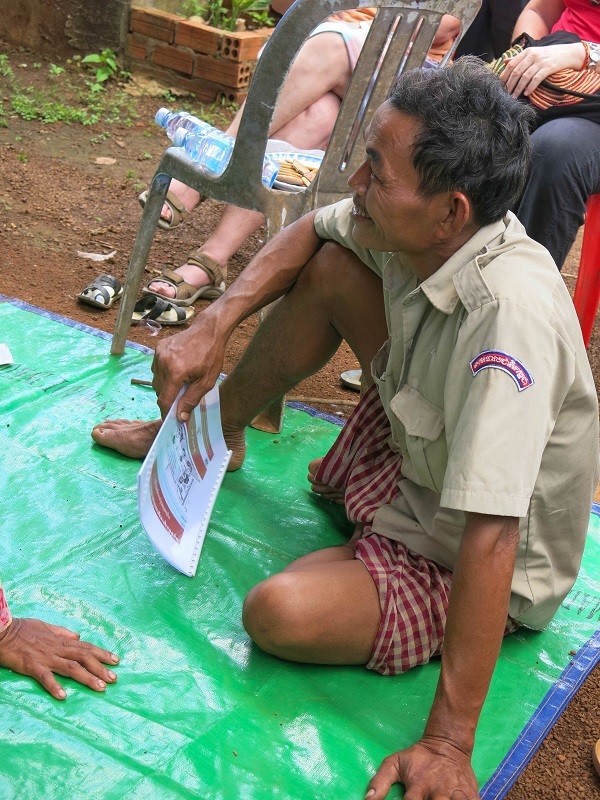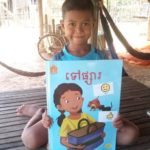
Funded by the World Bank, the Home-Based Reading project aims to increase the amount, quality, and effectiveness of students’ at-home reading behaviors. This one-year project will be 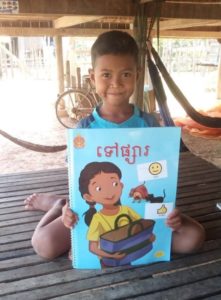 implemented in Kampong Thom and Battambang provinces, specifically targeting Grade 2 students and their caregivers.
implemented in Kampong Thom and Battambang provinces, specifically targeting Grade 2 students and their caregivers.
During the project’s 7-month implementation phase, WEI will provide participating Grade 2 students with books to keep and read at home, and participating caregivers with instructions on how best to encourage their child to read at home. Students will receive 59 books in total, including all of the pattern and sensory books developed by the Cambodian Ministry of Education, Youth and Sport and NGO experts under the Ministry’s early grade learning program, Komar Rien Komar Cheh.
By providing children with book packages for use at home, parents with instructions on how to encourage their children to spend time reading, and regular home visits and support from World Education’s trained Home Reading Friends, the project will contribute to building a culture of home reading and reading for enjoyment among early grade readers.
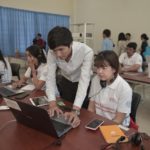
The Basic Education Equivalency Program (BEEP) is a three-year innovative, mobile learning initiative led by UNESCO and the Royal Government of Cambodia to provide out-of-school-youth with a distance-learning alternative education pathway towards earning 9th grade equivalency and completion of Lower Secondary School 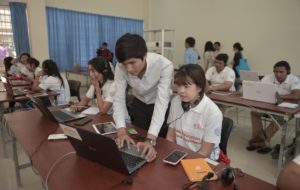 credential. BEEP enables Cambodian youth to complete their basic education through self-paced, blended and flexible learning modalities while continuing their work. The completion of basic education through BEEP will help them find better jobs or pursue further education to enhance their job competencies and life skills.
credential. BEEP enables Cambodian youth to complete their basic education through self-paced, blended and flexible learning modalities while continuing their work. The completion of basic education through BEEP will help them find better jobs or pursue further education to enhance their job competencies and life skills.
World Education’s EdTech Center will assist creation and management of a Moodle-based Learning Management system and will provide capacity building training to the Cambodian Ministry of Education, Youth and Sport Department of Information Technology and the Institute of Technology Cambodia staff.
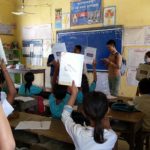
Results-Based Financing for Enhancing Book Distribution in Cambodia
Since 2017, World Education, Inc. and John Snow, Inc. (JSI) have received funding from the World Bank under the Reach for Reading initiative to help improve the transparency and accountability of the education supply chain in Cambodia. Under this project, WEI, JSI and the government redesigned and piloted the Track and Trace digital platform. Track and Trace (TnT), originally developed by JSI and WEI with funding from the All Children Reading Grand Challenge, is a technology solution that uses cost effective technology tools to allow school directors, school support committees, government staff, and textbook distributors to track, in real time, the ordering and distribution of government textbooks to ensure that they reach the schools they were destined for in a timely manner and in the right condition. TnT enhances the central government and community’s visibility into the location of textbooks during the distribution process.
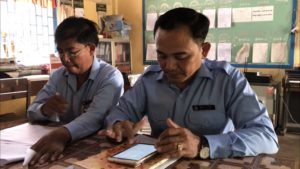 World Education and JSI have worked closely alongside the Cambodian Ministry of Education, Youth and Sports (MoEYS) to design and pilot the Track and Trace digital platform that utilizes tools ranging from a chatbot to a smartphone app and web-based dashboard. TnT was trialed at 416 schools across Cambodia and the project trained over 600 school directors and 800 School Support Committee members on its use. The project has met with great success. The central ministry received digital book requests form 100% of pilot schools within two weeks, compared to the usual six months in the paper-based system. During book distribution, all pilot schools and District Offices of Education submitted digital receipts and dispatch records on TnT. TnT generated comprehensive data on the progress and accuracy of deliveries that was available to MoEYS officials from district up to central level through web-based dashboards and reports.
World Education and JSI have worked closely alongside the Cambodian Ministry of Education, Youth and Sports (MoEYS) to design and pilot the Track and Trace digital platform that utilizes tools ranging from a chatbot to a smartphone app and web-based dashboard. TnT was trialed at 416 schools across Cambodia and the project trained over 600 school directors and 800 School Support Committee members on its use. The project has met with great success. The central ministry received digital book requests form 100% of pilot schools within two weeks, compared to the usual six months in the paper-based system. During book distribution, all pilot schools and District Offices of Education submitted digital receipts and dispatch records on TnT. TnT generated comprehensive data on the progress and accuracy of deliveries that was available to MoEYS officials from district up to central level through web-based dashboards and reports.
Based on this success, in April 2019, the Minister of Education declared that the government will take over the management and funding of the TnT platform and will begin using it nationwide in 2020. WEI and JSI will continue to support the government in this national scale up.
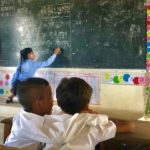
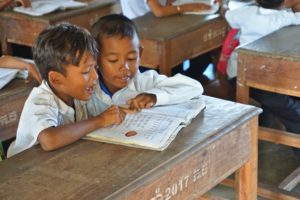 Supported by the U.S. Agency for International Development, the All Children Reading-Cambodia (ACR-C) and All Children Learning (ACL) projects are working to improve the early grade reading (EGR) skills of children in upper pre-school, Grades 1 and 2 in Cambodia. World Education has been subcontracted by Research Triangle International (RTI) to assist the Cambodian Ministry of Education, Youth and Sports, its development partners, nongovernmental organizations, and the private sector to harmonize EGR teaching and learning approaches across the country.
Supported by the U.S. Agency for International Development, the All Children Reading-Cambodia (ACR-C) and All Children Learning (ACL) projects are working to improve the early grade reading (EGR) skills of children in upper pre-school, Grades 1 and 2 in Cambodia. World Education has been subcontracted by Research Triangle International (RTI) to assist the Cambodian Ministry of Education, Youth and Sports, its development partners, nongovernmental organizations, and the private sector to harmonize EGR teaching and learning approaches across the country.
As part of the All Children Reading-Cambodia project, World Education is working in over 480 schools in Kampong Thom province to support the roll-out of the government’s newly created Early Grade Reading package of teaching and learning materials, teacher professional development materials, and a literacy coaching model. Under the All Children Learning project, World Education is supporting the rollout and implementation of the Ministry’s EGR package, Komar Rien Komar Cheh, in approximately 990 schools in Kampot, Kampong Thom, and Kep provinces, and 9 districts with Provincial Teacher Training Centers (PTTCs) and Teacher Education Colleges (TECs). In Kampot province, WEI is responsible for coordinating the training of 100% of school directors, upper preschool, Grade 1, and Grade 2 teachers. During the 2019-2020 school year, WEI’s 48 trained Literacy Coaches supported 426 Grade 1 teachers with intensive, twice-monthly coaching. During the 2020-2021 school year, the Literacy Coaches are providing intensive coaching support to all Grade 2 teachers. Similarly, in Kampong Thom and Kep provinces, WEI is providing operational management and field-based technical oversight of the coordination and logistics for the training of 100% of Grade 1 and Grade 2 teachers. In Kampong Thom, WEI’s technical staff is leading the facilitation of training workshops, while 52 trained Literacy Coaches are supporting approximately 600 Grade 2 teachers through intensive, twice-monthly coaching. A mobile training team, consisting of 19 WEI trainers, is supporting the EGR training of all Grade 1 teachers and school directors in nine select districts across nine provinces with Provincial Teacher Training Centers or Teacher Education Colleges, enabling teacher trainees to complete their practicum at schools that are implementing the Komar Rien Komar Cheh package.
Additionally, WEI is also building the capacity of central MoEYS to plan, implement, and manage this ambitious EGR training rollout in the remaining provinces across the kingdom. Lastly, WEI’s most senior technical education experts are working at the national level to support the continued development of the Komar Rien Komar Cheh package and teacher training materials.
Combined, the projects are providing training to over 2,600 EGR teachers and 800 school directors. WEI is also providing intensive, one-on-one coaching to over 2,000 EGR teachers. No other organization in Cambodia is providing such wide-scale field-level support to the government in its application of its new Early Grade Learning reforms.
A Day in the Life: Improving Early Grade Reading Through Intensive Coaching
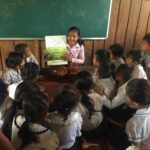
The McGovern-Dole Food For Education (FFE) project is a three-year program supported by the U.S. Department of Agriculture to improve food security, expand access to primary education, promote early childhood development, and enhance learning outcomes in Cambodia.
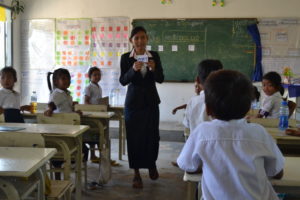 In collaboration with the World Food Programme, World Education is leading the literacy component across Siem Reap and Kampong Thom provinces in Cambodia with implementing partner Kampuchean Action for Primary Education (KAPE).
In collaboration with the World Food Programme, World Education is leading the literacy component across Siem Reap and Kampong Thom provinces in Cambodia with implementing partner Kampuchean Action for Primary Education (KAPE).
World Education and KAPE are working to strengthen teaching approaches and materials used in more than 500 schools. The project is training over 3,000 teachers and librarians on early literacy and child development, equipping classrooms with thousands of learning and teaching materials, and building the capacity of government teacher education providers, school leaders, and officials to strengthen and support teachers’ ongoing professional development at all stages system-wide.
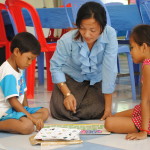
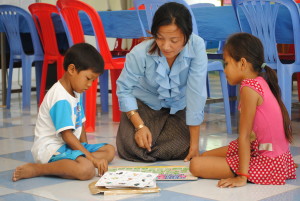
- Reading Benchmarks
World Education collaborated with the Ministry of Education, Youth and Sport (MoEYS) to create a reading benchmark system for the new national reading curriculum. The first early-grade reading benchmark system in Cambodia, it includes specific tasks and skills that students should master at designated intervals. The benchmarks include regular interval assessments, which allow teachers to identify struggling students and provide timely, targeted support.
Each interval assessment includes statements of reading abilities, associated reading skills, content summaries, and indicative tasks that illustrate the stated competencies. This approach of unbundling the composite score enables teachers to consider basic literacy skills in isolation and ensure student proficiency across several indicators. These benchmarks have been fully endorsed by the MoEYS.
- Literacy Coaches
TRAC selected and trained school-based literacy coaches, the first time such a position has been created in Cambodian schools. These coaches help teachers administer the benchmark assessments and the Rapid Response System interventions. They also act as the liaison between schools and parents.
- Rapid Response System
TRAC was highly successful in its aim of implementing an innovative and holistic approach to the instruction of early-grade reading in Cambodia.
- 94% of TRAC-participant teachers and 100% of TRAC literacy coaches utilized the Rapid Response System to provide targeted reading interventions to struggling students.
- 73.3% of parents reported improved engagement in their children’s education due to TRAC.
- 160 tablets and 1,908 textbooks and learning materials were provided to the eight TRAC pilot schools.
- On average, TRAC-participant first graders scored 6.4% higher than control participants on an early-grade reading assessment administered at the end of year 1 of the project, and 13.6% higher at the end of year 2.
Through TRAC+, World Education is expanding the reach of TRAC programming to include Grade 3 reading benchmarks and assessments, and considerably scaling up the interventions from the eight pilot schools to 170 schools in five provinces. TRAC+ also includes pilot reading interventions for Grade 4-6 students in select target schools, and capacity development for key World Vision Cambodia staff over the course of the project. Overall, TRAC Plus is projected to benefit over 30,000 children in Grades 1-3 and 4,500 children in Grades 4-5, 50% of whom will be girls, and around 680 teachers. By focusing on the total learning environment, TRAC + is enhancing the ability of children to acquire essential early reading skills while encouraging a culture of reading both in school and at home.
Learning to Read: World Education’s innovative, holistic approach to early grade reading in Cambodia
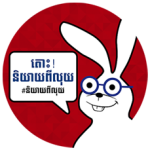
Financial products and services can be confusing to navigate- especially for people living in poverty in rural communities. With many trying to navigate banking for the first time, it is difficult to know who to trust. However, it is these very products and services that can help people living in poverty to save and build capital. World Education believes that by educating people in Cambodia on their rights and options when it comes to financial services, we can help lift people out of poverty and avoid the traps of over indebtedness.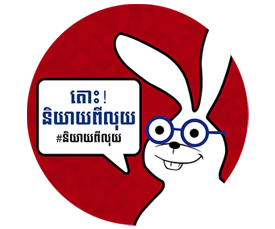
As part of the Digital Technology and Financial Empowerment (DTFE) project, Good Return and World Education in partnership with the National Bank of Cambodia launched the Tohs Niyeay Pi Luy (Let’s Talk Money) Campaign, which will run from March to June.
The goal of the Digital Technology for Financial Empowerment (DFTE) project and the Let’s Talk Money campaign is for young Cambodians to talk more about money, seek out information and use it to make wise money decisions. The campaign targets Cambodian youth (aged 15-30) in urban and rural communities across Cambodia and is built upon four themes: Negotiate, Choose, Use and Communicate.
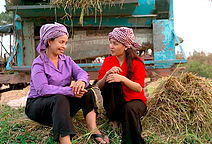 Mobile and digital technologies offer scalable and sustainable solutions to delivering educational and campaign content to Cambodia’s youth. The campaign will engage youth through a series of videos via Facebook, TV and radio, and campaign partners (such as schools, factories, NGOs and Smart – Cambodia’s leading mobile operator). Each video contains an educational message and call to action. These are complemented with voxpop videos, facilitation guides, information sheets and campaign marketing collateral. The campaign is delivered through digital technologies and targeted at Cambodia’s youth, with the goal of stimulating inter-generational dialogue within poor Cambodian households. World Education is thrilled to support this effort to empower financial consumers with the information and skills they need to thrive.
Mobile and digital technologies offer scalable and sustainable solutions to delivering educational and campaign content to Cambodia’s youth. The campaign will engage youth through a series of videos via Facebook, TV and radio, and campaign partners (such as schools, factories, NGOs and Smart – Cambodia’s leading mobile operator). Each video contains an educational message and call to action. These are complemented with voxpop videos, facilitation guides, information sheets and campaign marketing collateral. The campaign is delivered through digital technologies and targeted at Cambodia’s youth, with the goal of stimulating inter-generational dialogue within poor Cambodian households. World Education is thrilled to support this effort to empower financial consumers with the information and skills they need to thrive.
In addition to developing the campaign, World Education and Good Return will measure to what extent a consumer awareness campaign, delivered through digital technologies and targeted at Cambodia’s youth, can be effective in stimulating dialogue on financial decision making and ultimately contribute to building financial awareness and consumer confidence.
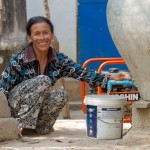
Good Return is the Asia-Pacific regional microfinance intiative of World Education. Good Return has a regional office in Cambodia that supports several partnerships and programs in collaboration with World Education Cambodia.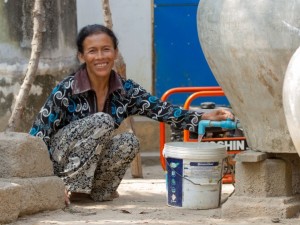
Good Return works in partnership with the Cambodian Microfinance Association, which is the national-level representative of Cambodia’s leading microfinance agencies / financial service providers (FSPs). The partnership spans the following projects:
- In March 2016, Good Return and World Education in partnership with the National Bank of Cambodia launched the Tohs Niyeay Pi Luy (Let’s Talk Money) Campaign. The campaign is designed to encourage young people across Cambodia to start talking about the way they use, manage and grow money. Read more about the campaign and how youth are involved in our feature story about youth voice.
- The Consumer Awareness and Financial Empowerment (CAFE) Initiative. The CAFE Initiative comprises two main elements. CAFE Face 2 Face delivers intensive financial capability training and coaching support to the most vulnerable clients of an FSP. CAFE Accelerator seeks to embed positive FSP-client communication and interactions into the daily operations of the FSP, thereby reaching and benefiting all of its clients.
- With support from the French Development Agency AFD and the Smart Campaign, Good Return and CMA are working with four Cambodian FSPs (Sathapana, Kredit, Vision Fund Cambodia and Thaneapea Khum Cambodia) to strengthen client protection practices and achieve the industry standard for good practice in protecting the rights and interests of microfinance clients.
- Good Return and CMA have worked with seven FSPs to develop an updated Progress out of Poverty Index scorecard for Cambodia. This enables Cambodian MFIs to better target poor clients for their services and report on their poverty outreach and client progress out of poverty.
Good Return also has a direct partnership with Thaneakea Phum, which it has supported to establish an in-house client financial education training program, as well as prepare for client protection certification and manage its social performance.
Meet Ms. Mao Rin – Good Return Success Story
Good Return provides loan capital to Thaneakea Phum and other partners through its peer-to-peer lending platform: http://loans.goodreturn.org.au/
Find out more about Good Return programs here: https://programs.goodreturn.org.au/

